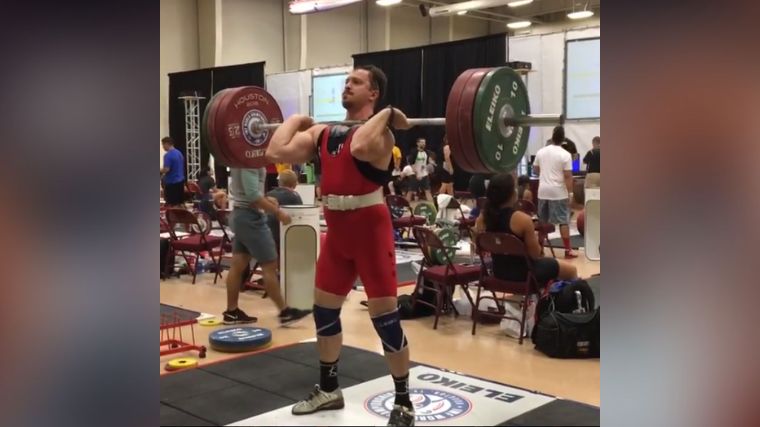Taking the platform at your first (or any meet for that matter) can be a very nerve racking experience. Preparation can set you apart from others, as you will be more apt to come ready, warm up sufficiently, and stay calm and focused when it is your time to go.
Earlier last month, USA Weightlifting hosted the University Nationals and Under 25 Championships, that welcomed some of the best up and coming competitive weightlifters in the United States. As you may guess, many of these athletes are at a higher level than most, with many weightlifting meets under the belt. Among the lifters was Brian Freeman, who was competing in only his third ever weightlifting meet, and first meet on a national stage. After the meet, Brian and I went over his meet experience, and the top five things newbie/intermediate weightlifters can do to better prepare, plan, and execute for their next weightlifting meet.

[Read More: The Most Effective Workout Splits, Created by Our Experts]
1. Listen To Your Coach
Simply put, “Focus on lifting your weights and let your coach handle EVERYTHING else.” A coach’s role is to not only to support your programming and technique, but also facilitate your overall performance, moderate and monitor stress, and enable you to focus completely on the task(s) at hand. Allow your coach to converse with officials, time your sets, administer your warm ups, stretching, and lift attempts; you just focus on making lifts.
2. Pack Properly
There is nothing worse than forgetting to pack your other weightlifting shoe, lifting belt, carb sources, or even singlet. Preparing your bag the day before, or even a few days before will minimize the anxiety and stress you may get on the day of if you happen to forget something. In the event you forget something, make sure to adhere to the first tip: listen to your coach.
3. Don’t Miss Your Weight Class
Leading up to your meet, you need to be monitoring your weight, nutrition status, and hydration. Athletes and coaches need to have an understanding on how much weight can fluctuate, what foods do best for weight and performance, and how a potential weight cut could affect performance. Minimize the stress of making weight by planning ahead.
4. R.E.L.A.X.
Optimal performance is found between a balance of stress, anxiety, and confidence. Trust in your coaches and effort in the gym, your preparation coming into the meet, and your abilities on the platform. Stay calm, stay focused, and have fun.
Your warm up needs to be a calculated training session that will leave your central nervous system, body, and mental state elevated as you state step onto the platform. Too often newbie weightlifters come into warm ups with little plotted out attempts. Lack of planning warm up attempts often results in missed reps, too many repetitions, and fatigue; all of which affect a lifter’s confidence and performance on the platform. Typically, a lifter’s first attempt should be taken after they have hit anywhere from 5-10 (max) progressed repetitions. In my experience, doing less than 8 total repetitions (not counting unloaded barbell warm ups) has allowed for the best performance and mental preparedness.
Time to Take The Platform
Every lifter and coach has a different training approach. Brian Freeman, as well as many others, has found great results by individualizing pre and intra competition training and mental approaches. Coaches and athletes should monitor and assess performance and the tactics taken to achieve success (and even failure) to better understand and reconstruct a better preparation plan.
Editors note: This article is an op-ed. The views expressed herein are the authors and don’t necessarily reflect the views of BarBend. Claims, assertions, opinions, and quotes have been sourced exclusively by the author.
Featured Image: @b__free__fitness on Instagram